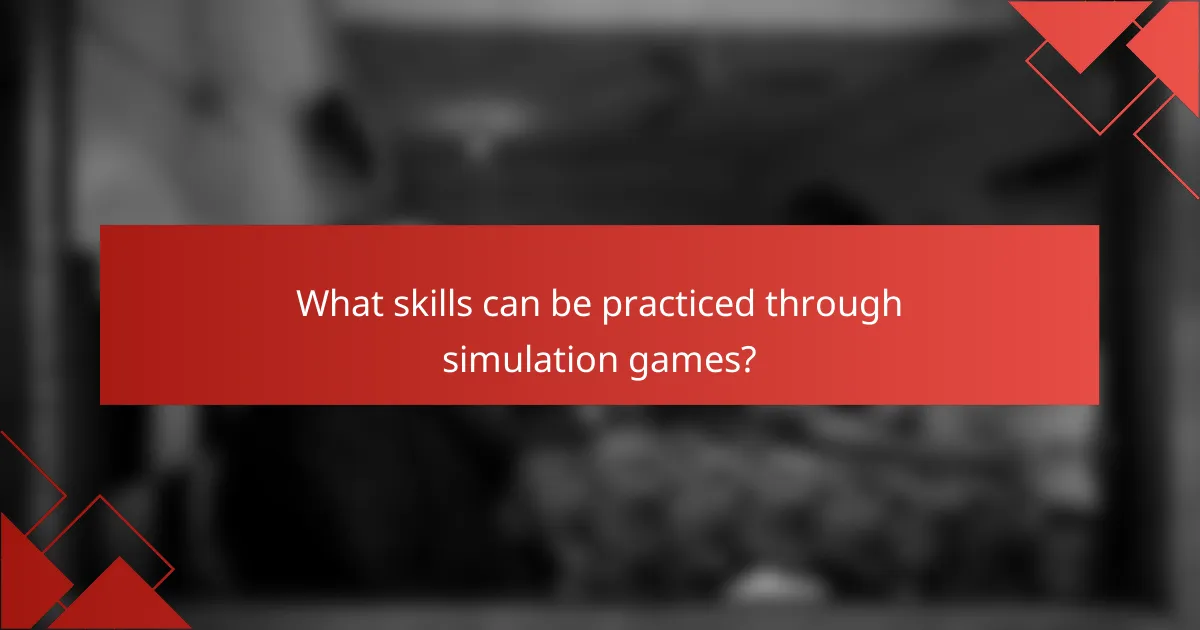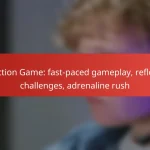Simulation games offer a unique opportunity to engage with real-world scenarios, allowing players to practice essential skills such as critical thinking and teamwork. By immersing themselves in these realistic environments, users can experiment with decision-making and resource management without facing real-life consequences. Additionally, these games foster creative expression, enabling players to design and narrate their own experiences, making creativity a vital component of the gameplay.

How do simulation games apply to real-world scenarios?
Simulation games are designed to mimic real-world situations, providing players with opportunities to practice skills, make decisions, and explore creative solutions. These applications span various fields, enhancing training, planning, and strategic thinking in practical contexts.
Training for emergency responders
Simulation games for emergency responders focus on realistic scenarios that require quick thinking and effective decision-making. For instance, fire and rescue simulations allow trainees to practice handling crises, coordinating with teams, and managing resources under pressure.
These training modules often incorporate real-life protocols and standards, ensuring that responders are familiar with emergency procedures. Utilizing virtual environments can significantly improve response times and situational awareness, which are critical in actual emergencies.
Urban planning simulations
Urban planning simulations enable city planners and stakeholders to visualize and assess the impact of various development strategies. These simulations allow users to manipulate variables such as population density, transportation systems, and land use to see potential outcomes.
For example, planners can simulate the effects of a new public transit line on traffic patterns and housing development. This helps in making informed decisions that balance growth with sustainability, often guided by local regulations and community needs.
Military strategy exercises
Military strategy simulations are used to train personnel in tactical decision-making and resource management. These exercises can range from small unit tactics to large-scale operations, allowing participants to engage in realistic combat scenarios without real-world consequences.
By analyzing past conflicts and employing various strategies in a controlled environment, military leaders can refine their approaches and improve coordination among units. Such simulations often incorporate historical data and current military doctrines to enhance realism and effectiveness.
Healthcare training programs
Healthcare training programs utilize simulation games to prepare medical professionals for real-life clinical situations. These programs often involve virtual patients, allowing trainees to practice diagnosis, treatment, and patient interaction in a safe setting.
For instance, surgical simulations enable doctors to hone their skills on virtual models before performing actual procedures. This hands-on experience is invaluable in reducing errors and improving patient outcomes, aligning with healthcare standards and best practices.

What skills can be practiced through simulation games?
Simulation games provide a platform for practicing various skills, including critical thinking, teamwork, resource management, and problem-solving. These games create realistic scenarios where players can experiment and learn without real-world consequences.
Critical thinking development
Simulation games challenge players to analyze situations, make decisions, and evaluate outcomes. By engaging in complex scenarios, players enhance their ability to think critically and strategically. For instance, a flight simulator requires users to assess weather conditions and aircraft performance, fostering analytical skills.
To maximize critical thinking development, players should actively reflect on their decisions and consider alternative strategies. Avoiding impulsive choices and taking time to analyze the situation can lead to better outcomes.
Team collaboration enhancement
Many simulation games require players to work together to achieve common goals, promoting teamwork and communication skills. In multiplayer environments, participants must coordinate their actions and share information effectively. Games like “Among Us” or “Overcooked” exemplify the need for collaboration to succeed.
To improve team collaboration, players should focus on clear communication and establish roles within the team. Regularly discussing strategies and providing constructive feedback can strengthen group dynamics and enhance overall performance.
Resource management skills
Simulation games often involve managing limited resources, which helps players develop budgeting and prioritization skills. Games like “SimCity” or “Civilization” require users to allocate resources wisely to build and expand their virtual worlds. This practice translates well to real-life scenarios, such as managing finances or time.
To effectively manage resources in simulation games, players should track their usage and adjust strategies as needed. Setting clear goals and regularly reviewing progress can help maintain focus and optimize resource allocation.
Problem-solving abilities
Players encounter various challenges in simulation games that require innovative solutions, enhancing their problem-solving abilities. These games often present obstacles that demand creative thinking and adaptability. For example, in strategy games, players must devise tactics to overcome opponents or environmental challenges.
To strengthen problem-solving skills, players should approach challenges with a growth mindset, viewing failures as learning opportunities. Experimenting with different solutions and analyzing their effectiveness can lead to improved problem-solving strategies over time.

How do simulation games foster creative expression?
Simulation games encourage creative expression by providing players with tools and environments to explore their imagination. These games allow users to design, build, and narrate experiences, making creativity an integral part of gameplay.
Game design and development
In simulation games, players often engage in game design and development by creating their own levels, characters, or scenarios. This process can involve using intuitive interfaces that allow for easy manipulation of game elements, fostering a sense of ownership and creativity. For instance, games like “The Sims” enable players to design homes and communities, reflecting their personal style and preferences.
Moreover, the iterative nature of game development in simulations encourages experimentation. Players can test their designs, receive feedback, and refine their creations, enhancing their creative skills over time.
Storytelling through gameplay
Simulation games often incorporate storytelling elements that allow players to craft narratives within their gameplay. Players can develop characters, plotlines, and settings, which enhances their ability to express themselves creatively. For example, in games like “Minecraft,” players can create intricate stories through their building choices and interactions with other players.
This storytelling aspect not only makes the gameplay more engaging but also provides an avenue for players to explore complex themes and emotions, enriching their overall experience.
Artistic customization options
Artistic customization options in simulation games play a crucial role in fostering creative expression. Players can often modify characters, environments, and objects to reflect their unique artistic vision. For instance, many simulation games offer extensive color palettes, textures, and design tools that allow for personalized creations.
Additionally, these customization features can lead to community sharing, where players showcase their designs and inspire others. This collaborative aspect further enhances creativity, as players learn from one another and build upon shared ideas.

What are the prerequisites for effective simulation gaming?
Effective simulation gaming requires a solid understanding of game mechanics and the technical skills necessary for game creation. These prerequisites enable developers and players to create engaging, realistic experiences that can be applied in real-world scenarios.
Understanding game mechanics
Game mechanics are the rules and systems that govern how a simulation operates. Familiarity with concepts such as feedback loops, player progression, and resource management is essential for creating a compelling experience. For instance, in a flight simulator, understanding how aerodynamics affect flight behavior is crucial for realism.
To effectively utilize game mechanics, consider the target audience and the learning objectives. Tailoring mechanics to suit the players’ skill levels can enhance engagement and facilitate learning. For example, introducing gradual challenges can help players build confidence and skills over time.
Technical skills for game creation
Technical skills are vital for developing and implementing simulation games. Knowledge of programming languages such as C# or Python, as well as familiarity with game engines like Unity or Unreal Engine, is often required. These tools allow developers to create interactive environments and realistic simulations.
Additionally, understanding graphic design and sound engineering can significantly enhance the quality of a simulation. Incorporating high-quality visuals and audio can make the experience more immersive. A checklist for technical skills might include:
- Proficiency in programming languages
- Experience with game development platforms
- Basic graphic design knowledge
- Sound design fundamentals

What criteria should be considered when choosing a simulation game?
When selecting a simulation game, consider factors such as the target audience, the realism and accuracy of the game, and the platforms available for play. These criteria will help ensure the game meets your needs and provides a meaningful experience.
Target audience suitability
Understanding the target audience is crucial when choosing a simulation game. Different age groups and skill levels may require varying levels of complexity and engagement. For example, a game designed for children may focus on basic concepts and colorful graphics, while one aimed at adults might incorporate advanced strategies and realistic scenarios.
Additionally, consider the interests of the audience. A flight simulator may appeal to aviation enthusiasts, while a farming simulation might attract those interested in agriculture. Matching the game to the audience’s preferences can enhance enjoyment and learning outcomes.
Realism and accuracy levels
The realism and accuracy of a simulation game can significantly impact its effectiveness. Games that closely mimic real-world scenarios can provide valuable insights and skills applicable in real life. For instance, a medical simulation game that accurately portrays surgical procedures can be beneficial for training healthcare professionals.
However, higher realism often requires more complex mechanics, which may not be suitable for all players. Balance is key; choose a game that offers enough realism to be educational while remaining accessible and enjoyable for the intended audience.
Available platforms and accessibility
When selecting a simulation game, consider the platforms on which it is available, such as PC, consoles, or mobile devices. Accessibility is vital for ensuring that all potential players can engage with the game. For example, a game available on multiple platforms can reach a broader audience.
Additionally, check for accessibility features that accommodate players with disabilities. Options like customizable controls, subtitles, and colorblind modes can enhance the gaming experience for everyone. Prioritizing accessibility ensures that the simulation game can be enjoyed by a diverse group of players.

What are the emerging trends in simulation gaming?
Emerging trends in simulation gaming highlight advancements in technology and user engagement, focusing on realism and interactivity. These trends include the integration of virtual reality (VR), artificial intelligence (AI), and multiplayer experiences that enhance both learning and entertainment.
Real-world applications
Simulation games are increasingly utilized in various real-world applications, from education to professional training. For instance, flight simulators are used by airlines to train pilots, while medical simulations help healthcare professionals practice procedures without risk to patients.
These applications often employ realistic scenarios that mimic real-life challenges, allowing users to develop critical skills in a safe environment. Industries such as military, engineering, and emergency response also leverage simulation games for training purposes, enhancing readiness and decision-making capabilities.
Skill practice
Simulation games provide an effective platform for skill practice across diverse fields. Players can refine their abilities in areas such as strategic thinking, problem-solving, and teamwork through engaging gameplay that mirrors real-life situations.
For example, business simulation games allow users to manage virtual companies, helping them understand market dynamics and financial management. This hands-on experience can significantly boost confidence and competence in real-world tasks.
Creative expression
Simulation games foster creative expression by allowing players to design and customize their environments or characters. This aspect encourages users to explore their imagination and develop unique solutions to challenges within the game.
Games like “The Sims” and “Minecraft” exemplify this trend, enabling players to build intricate worlds and narratives. Such creative outlets not only enhance enjoyment but also promote skills like design thinking and innovation.


